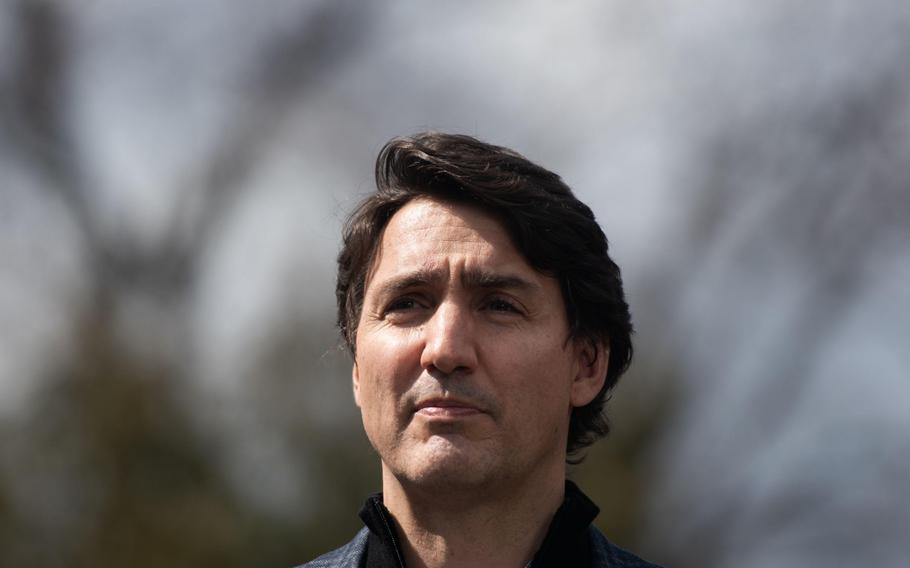
Justin Trudeau, Canada’s prime minister, speaks during an event announcing Budget 2022 investments in housing in Hamilton, Ontario, on April 8, 2022. (Galit Rodan/Bloomberg)
Ten thousand Uyghurs may soon be able to live in Canada after its Parliament voted unanimously in favor of a motion to allow the resettlement of the persecuted, mostly Muslim, minority from China.
Lawmakers in Canada's House of Commons voted in favor Wednesday of the proposal 322-0, with the chamber erupting into applause as the motion was carried.
The bill calls for the program — which would accept Uyghurs from countries outside China — to begin in 2024 and take place over two years. The next procedural step is for a report to be collated in the next 100 days on how the plan could be implemented.
The motion is a declaration of purpose and does not require the government to act on it. However, both Prime Minister Justin Trudeau and Immigration Minister Sean Fraser voted in favor of it, although they have not expressly stated how or when it might be executed. Canada's Immigration Ministry did not immediately respond to a request for comment Thursday morning.
"Canada will always do its part in helping those in need of protection," Fraser said in a statement reported by Reuters. "I am committed to working with members of all parties to advance the measures outlined in the motion adopted by the House of Commons today."
The bill, M-62, was introduced by Liberal Party member Sameer Zuberi, who called it a "historic moment."
"This was a good day for Canada, for the Uyghur people, and our human family," he tweeted.
Mao Ning, a Chinese Foreign Ministry spokeswoman, responded to the proposal in a news conference Thursday, accusing Ottawa of "politically manipulating Xinjiang-related issues for ulterior motives, spreading disinformation and misleading the public."
Since 2017, Beijing has carried out a sweeping crackdown in the northwestern Xinjiang region under the banner of counterterrorism, undertaking campaigns to forcibly assimilate the mostly Muslim ethnic minority group. Experts estimate that Chinese authorities have detained more than 1 million Uyghurs as part of the crackdown, holding them in centers and reeducation camps and drawing international condemnation.
China consistently rejects these allegations. Mao claimed Thursday that "Xinjiang enjoys security, stability and a sound momentum of development. People there live a peaceful and happy life."
Canada has previously taken a firm stance on China's treatment of the Uyghurs. In February 2021, Canada's Parliament voted to recognize the persecution of Uyghurs and other Turkic Muslims as "genocide."
Ottawa's move came shortly after the State Department also categorized Beijing's actions as "genocide." In 2021, the United States also banned imports from Xinjiang, including cotton and tomatoes, over concerns of forced labor.
This week's Canadian bill stated that Uyghurs face "pressure and intimidation by the Chinese state to return to China," where they risk torture, detention, forced sterilization and forced labor. It added that many third-party countries who take in Uyghur refugees face "economic pressure" from Beijing to detain or deport Uyghurs, leaving them "without a safe haven in the world."
Several rights groups welcomed the news from Ottawa, urging Canada to adopt the plan soon and for other lawmakers around the world to take similar stands.
"This motion sets a very important example of how States can respond to the Uyghur genocide and concretely support Uyghurs refugees at risk in third countries," Dolkun Isa, president of World Uyghur Congress, said in a statement, praising the bipartisan support and calling for its quick implementation.
"Words are important, but Uyghurs need to see action," said Omer Kanat, executive director of the Washington-based Uyghur Human Rights Project, in a statement. "Every parliament that has officially recognized genocide in the Uyghur region must back up their words with concrete programs to support Uyghurs in need of resettlement."
Maya Wang, associate director in the Asia division of Human Rights Watch, said: "We welcome the decision, but much depends on whether and how it will be implemented. If it's implemented, it depends on whether the system would be resourced such that persecuted Uyghurs can seek safe harbor at a reasonable speed."
Activists elsewhere also hailed Canada's move. "We applaud the Canadian parliament," tweeted the Hong Kong Democracy Council, a Washington-based nonprofit. "Democratic countries should take this as an example of what can be done to assist those fleeing #CCP persecution," referring to the Chinese Communist Party.
In Australia, activist Inty Elham expressed hope that the move would inspire the government in Canberra to take similar steps, while the Uyghur American Association hailed it as a "historic event."
The Canadian government has long adopted an approach of attracting immigrants to offset the impact of low birthrates and an aging population.
Late last year, it announced plans to set record immigration goals to bring in 1.45 million immigrants by 2025 to help plug labor shortages. It stood in contrast with many other Western governments, where officials have talked up curbing immigration and cast migrants as an economic burden.
The Washington Post's Ellen Francis contributed to this report.